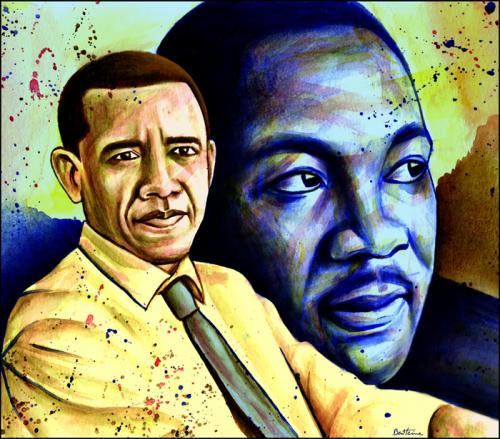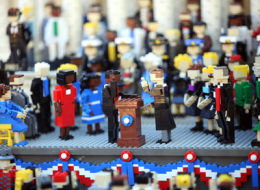 By Nick Li
By Nick Li
At 12pm EST on Tuesday, January 20th 2009 Barack Obama will be sworn in as the 44th President of the United States. Americans and the rest of the world have high hopes for this man – nothing less than ending a global financial crisis and economic downturn, fighting the scourges of disease and poverty, promoting reconciliation and peace between the West and the Muslim world, and restoring America’s global moral authority (though we can debate whether or not it has possessed such a moral authority in decades).

As President Obama’s inauguration comes the day after Martin Luther King Day, a Federal holiday in the United States commemorating the late civil rights leader, he will undoubtedly address the legacy of Dr. King. While he is almost certain to talk about Dr. King’s leadership in the fight to end segregation and ensure civil rights for African Americans, I hope he does not forget about the other parts of Dr. King’s legacy. Dr. King’s greatness lay in his refusal to let the ends justify the means and his understanding of the root causes of violence and despair.
Non-violence
As in the case of that other famous pacifist Mohatma Gandhi, King’s death by assassination led to outrage and riots across the country that left 46 people dead and 2,600 injured. King would have understood this reaction but no doubt it would have saddened him greatly. He believed that "the Christian doctrine of love operating through the Gandhian method of nonviolence was one of the most potent weapons available to oppressed people in their struggle for freedom."
In his "Letter from a Birmingham Jail" he wrote
In any nonviolent campaign there are four basic steps: collection of the facts to determine whether injustices exist; negotiation; self purification; and direct action.
It is true that the police have exercised a degree of discipline in handling the demonstrators. In this sense they have conducted themselves rather "nonviolently" in public. But for what purpose? To preserve the evil system of segregation. Over the past few years I have consistently preached that nonviolence demands that the means we use must be as pure as the ends we seek. I have tried to make clear that it is wrong to use immoral means to attain moral ends. But now I must affirm that it is just as wrong, or perhaps even more so, to use moral means to preserve immoral ends. Perhaps Mr. Connor and his policemen have been rather nonviolent in public, as was Chief Pritchett in Albany, Georgia, but they have used the moral means of nonviolence to maintain the immoral end of racial injustice. As T. S. Eliot has said: "The last temptation is the greatest treason: To do the right deed for the wrong reason."
The United States is currently involved in two wars where it is hard to make a case for the power of non-violent resistance. At the same time, there is a broader "global war on terror" where the battle for hearts and minds is not going so well. While Representative Dennis Kucinich’s dream of a Department of Peace is unlikely, restoring America’s moral leadership in the world and eroding the support base for radical Islamic terrorists requires that the United States refrain from exercising immoral means to attain moral ends or moral means to preserve immoral ends. Preventing conflicts like the recent Israeli incursion in to Gaza and ending practices like water-boarding would be an important beginning, though undoing George W. Bush’s legacy will take time. Dr. King would not necessarily be in favor of political revenge against the Bush administration through prosecutions as many Democrats desire, but he would undoubtedly use the power of shame and moral authority to bring past misdeeds to light.
Anti-poverty and Anti-imperialism
King was a major opponent of the Vietnam war. In his speech "Beyond Vietnam" delivered in 1967 he claimed that the US was in Vietnam "to occupy it as an American Colony" and called the US government "the greatest purveyor of violence in the world today." While this statement would never be uttered by a mainstream US politician, it would be hard to argue that it is less applicable to Iraq today than to Vietnam 40 years ago. King’s opposition to the war was based not only on his rejection of violence but on his anti-imperialist attitude and related critique of capitalism, which would put him squarely with Naomi Klein, Noam Chomsky and the "far left kooks" of today. He claimed that
A true revolution of values will soon look uneasily on the glaring contrast of poverty and wealth. With righteous indignation, it will look across the seas and see individual capitalists of the West investing huge sums of money in Asia, Africa and South America, only to take the profits out with no concern for the social betterment of the countries, and say: "This is not just."
We have yet to see that revolution of values. Obama has been vague about the future US military presence in Iraq and Afghanistan. If he wanted to stay true to Dr. King’s legacy, he would say no to permanent military bases in either country and re-prioritize development assistance over military aid to both Iraq and Afghanistan. His earlier statements on the campaign trail that Iraq has a large budget surplus so should be paying for its own reconstruction plays well to the US domestic audience, but history suggests that a strong Iraqi economy would be the best guarantor of stability so I hope he does not intend to short-change reconstruction efforts there. President Obama has suggested that delaying his pledges to increase foreign aid may be necessary due to the US federal budget deficit.I hope that is not the case – there is no good reason why the US cannot increase its share of foreign aid to a level similar to that of European countries and the UN target of 0.7% of GDP. There is a lot of room for cuts in the military budget. Perhaps the best thing President Obama could do is jumpstart the Doha trade-talks – agricultural liberalization might anger the Iowa farmers, but it will go a long way towards alleviating hunger and poverty in the developing world and he can avoid antagonizing his union base by focusing on agriculture. Free trade is one of the first things to go in a global economic downturn but Obama’s leadership could be instrumental in harnessing global capitalism to help the world’s poor. At home, Obama has an opportunity to put the US on a long-term path towards greater opportunity and equality but it would be foolish to think he will accomplish it without a struggle, through nothing but high-minded bi-partisanship and compromise. Dr. King was jailed, called a communist, and wiretapped by the FBI for his efforts, and eventually assassinated. While it is tempting to think that Obama can achieve his fantastic goals through a spirit of national unity and hopefulness, he will soon be tested by the powers that be and I hope that he can show the kind of resolve exemplified by Dr. King in the face of adversity.
The world has high hopes indeed. Let us all hope that Obama can offer the caliber of leadership of Dr. King and recognize the interconnectedness of the world’s people and the world’s political, economic, environmental and security problems.

Let’s hope Obama will not turn out to be a dead sparrow!! (In case you are wondering what dead sparrows have to do with Obama, I would like to refer you to my comment on an earlier post.) I am a big fan of him, and I thought his speech of yesterday was brilliant, even though there was no memorable catchphrase like ‘I have a dream’, or ‘the only thing we have to fear is fear itself’, or ‘ask not what your country can do for you, but ask what you can do for your country’ in his speech. That obviously was a missed opportunity, because now we don’t know how to refer to this speech. Is it the ‘Yes we can’ speech? No, because he did not say ‘yes we can’, not even once. I thought Dr. Joseph Lowery’s Inauguration Benediction was beyond brilliant; it was even funny in the end. I just hope Obama will not disappoint.
Watch Barack Obama’s Inauguration Live Streaming Online – January 20 – Inauguration of Barack Obama as the 44th President of the United States. Obama and Vice President-elect Joe Biden are due to be sworn in and deliver inauguration speeches next Tuesday in Washington, D.C. Catch Barack Obama Inauguration Day live at
http://www.iwebie.com/barack-obama-inauguration-live-streaming-video-online